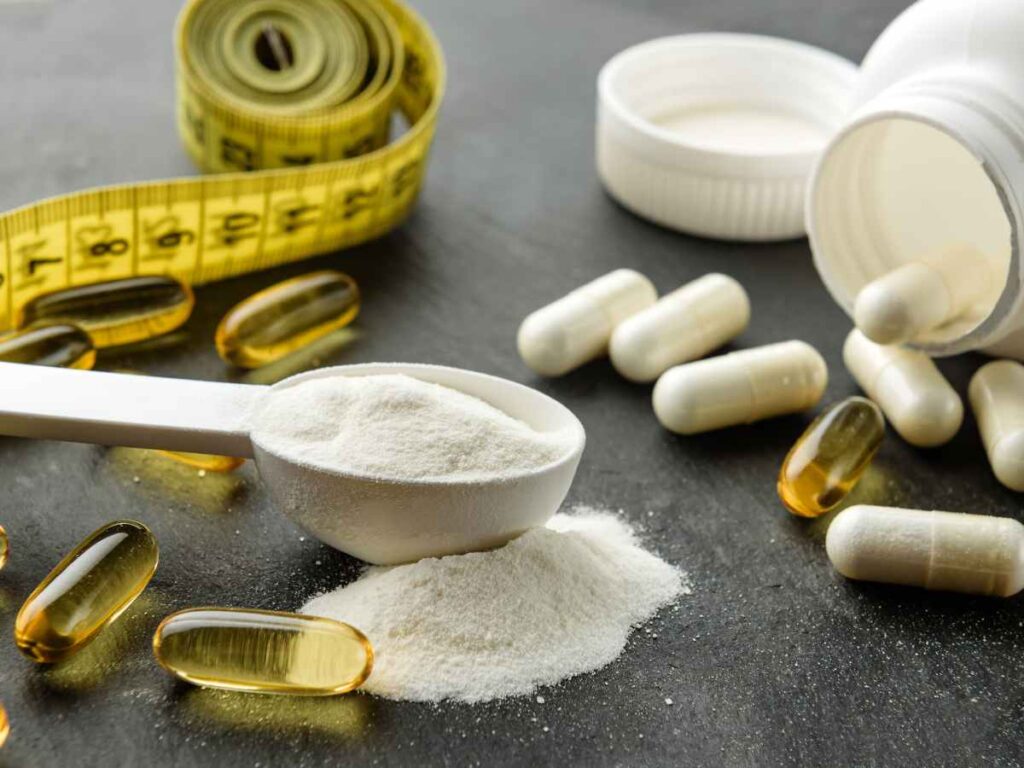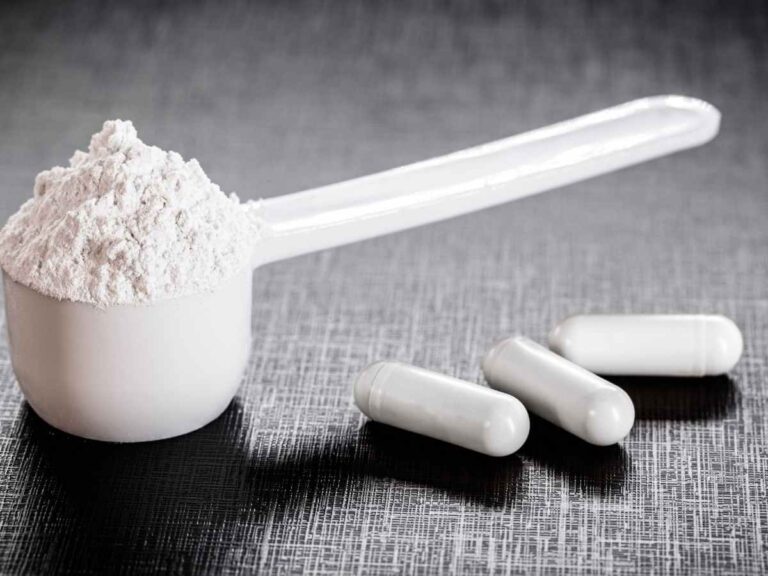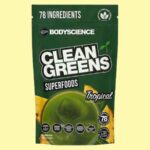Alrighty-then, let’s kick things off with a quick rundown, shall we? What exactly is creatine? It’s this nifty, naturally-occurring compound found right here in our bodies, specifically checkin’ into the muscle hotel. The science nerds also tell us it’s a combination of three amino acids – that’s glycine, arginine, and methionine, for you trivia buffs.
Our liver is like a world-class chef, whipping up roughly half of the creatine our bodies need daily – the other half comes from protein-rich grub like red meat and fish. It’s like your body’s VIP fuel, powering up your muscles for that epic set you’re about to crush at the gym. So, whether you’re benching your body weight or just chasing after your toddler, your muscles are getting their oomph from creatine. Impressive, right?
And in case you’re wondering, we’re not just talking about beefed-up bodybuilders here. Sure, these gym warriors swear by their creatine shakes, but even endurance athletes are getting in on the action. Even your brain uses some creatine, in case you need another reason to feel brainy today!
Why Use It?
Alright, let’s get down to it. The big ‘C’, Creatine. Why should you toss it into your shopping cart along with your kale and quinoa? One word, people: Performance. This little miracle can help supercharge your workout sessions, making you stronger and more powerful. It’s like the nitrous in your fitness race car!
And who doesn’t want a lean, mean, body machine that can bench press a bear, or at least the neighbor’s annoyingly yappy dog? But seriously, creatine’s got your back…and biceps…and quads. It’s all about helping you make the most of every rep, every sprint, every grueling spin class.
Honestly, why not tap into that secret sauce to really make those muscles pop? If a little scoop of creatine a day keeps the mediocre workouts away, I say, ‘Bring it on!’
| Type of Creatine | Ease of Use | Effectiveness | Possible Side-Effects |
|---|---|---|---|
| Creatine Monohydrate | High | High | Stomach upset, Muscle cramps |
| Creatine Ethyl Ester | Medium | Medium | Bloating, Nausea |
| Buffered creatine | High | Medium | Minimal, if any |
| Liquid Creatine | High | Low | Stomach upset, Dehydration |
How Does It Work?
Here’s the lowdown: creatine is a substance our bodies naturally produce, especially in our muscles and brains. Not nearly as dramatic as that cliffhanger on the most recent episode of your favorite show, right?
So when you’re busting a gut in the gym, creatine steps up to the plate. Think of it like your hyped-up workout buddy who keeps pushing you even when you’re dead beat. Like it or not, they help you keep going. Similarly, creatine elevates your muscle’s phosphocreatine levels. This assists in the creation of adenosine triphosphate (ATP) – the premium guest your workout party needs.
Why care about ATP? Ever leapt from your couch when your team clinches a last-minute victory? That burst of energy is ATP! The more you’ve got, the better your body can handle those grueling high-intensity workouts.
So, take it from me, creatine essentially cranks your performance up a notch, like blasting your favorite song while powering through that killer workout set. Now, don’t overdo it on the bicep curls, okay?
Who’s the Perfect Match for Creatine?
Alright folks, let’s delve into the nitty-gritty, who really stands to benefit from creatine? Well, my friend, creatine has your back whether you’re a gym rat lifting those dumbbells like a boss, or an endurance athlete pushing beyond your boundaries. Even if you’re just a regular Joe looking to upgrade your fitness game, it might just be your new best bud.
Do you know why? It’s because this marvelous little substance works wonders for increasing your body’s strength and power. Picture this: you’re busting out another rep, you’re sweating, you’re breathing heavily, and you feel like you’ve hit the wall. But wait – you’ve been taking your creatine supplement faithfully, and BAM! Your body finds a little extra power to nail that rep. How’s that for a cool gym buddy, huh?
Not just the weightlifters among us, even endurance athletes could have a bountiful relationship with creatine. Triathletes, long-distance runners, cyclists, you name it. Training for a marathon? Creatine can help you become a running machine – and who wouldn’t want that?
Oh, and let’s not forget our seniors. You may not realize it, but our bodies’ natural creatine production decreases as we age. Supplementing with creatine can help maintain muscle mass and functionality. Think of it as a pension for your muscles. A pretty neat deal, wouldn’t you say?
Now, there are always exceptions to the rule, and you know your body better than anyone else. As beneficial as creatine can be, it may not be right for everyone. It’s always a smart move to have a chat with your doctor before adding anything new to your regimen. But hey, if it works for you, you could only see the gains (literally!).
It’s Role in Building Those Impressive Muscles
So, you’re probably wondering: how the heck does creatine affect muscle growth? Well, let me explain. Creatine acts like a power generator for your muscle cells, helping them work harder and longer. It’s like a tiny, invisible cheerleader in your body yelling, “Go, muscles, go!” You gotta love having that kind of support, right?
But here’s the science part: creatine helps to increase the level of adenosine triphosphate (ATP) in your muscles. Now, ATP is a big deal. It’s like the fuel for your muscles—without ATP, your muscles simply can’t function. The more ATP your muscles have, the harder and longer they can work. So, by boosting the levels of ATP, creatine gives your muscles a serious performance boost. It’s like turbocharging your car’s engine!
But wait, there’s more! It also helps to draw water into your muscle cells, which can increase their size and strength. Studies have shown that creatine can significantly increase muscle fiber size, enhance muscular contraction, and promote overall muscle growth. Heck, it’s like letting your muscles drink from the fountain of youth.
But, like everything in life, it’s not a magic pill/powder. You still gotta grind in the gym and eat right. Creatine can be a big help, but trust me, it ain’t doing the heavy lifting for you!
Can Creatine Actually Aid in Shrinking Your Waistline?
Well, hello there, fitness enthusiast! Thinking about fat loss, are we? We both know there’s nothing like seeing that belly fat melt away, right? So, does creatine help in this? Hang on tight, folks, ’cause the answer isn’t that simple.
Let me put it this way, swallowing creatine supplements like candy won’t directly cause that body fat to vanish. Yep, not the answer we wanted, right? But here’s the twist. Even though it isn’t the fat-burning god we’re longing for, it’s the dashing assistant that amps up our workouts to tackle those fat deposits. Cracking the code, aren’t we? Let me dive deeper into this.
When you’re on creatine, it boosts your body’s ATP, essentially the power bank for your muscles. Better fuel supply equals better workouts, more reps, and yes, burning more calories! More calorie burn means you’re getting closer to burning that pesky fat bit by bit. Creatine is the stealthy ally, supporting fat loss from the sidelines. Makes sense, doesn’t it?
So, my friends, in an indirect, team player sort of way, creatine does push for fat loss. It’s the bestie always ready to give you a push toward your goal, or to impress your crush, no judgments!
But here’s the catch: don’t mistake creatine as a free pass to binge on your favorite junk. It’s not a free ticket to pack in those cheeseburgers and still expect that fat to bid adieu. Remember, hard work and smart eating are key, while creatine plays a supporting role. Combined, you might just see the fat loss results you crave. Now, isn’t that food for thought?
| Daily Creatine Intake | Exercise Routine | Healthy Eating | Potential Fat Loss Results |
|---|---|---|---|
| 3-5g | High-intensity strength training | Protein-rich, low in saturated fats and sugars | Improved |
| 3-5g | Minimal to no exercise | Poor diet high in junk food | Minimal to none |
| None | High-intensity strength training | Protein-rich, low in saturated fats and sugars | Slow |
Where’s Creatine Phosphate Hiding Out In Your Body?
Okay, everyone. Let’s get to the heart of the matter. We’re going deep into the human body to see where creatine phosphate likes to hang out. And trust me, it’s way cooler than your favorite café.
Creatine phosphate, or phosphocreatine if you’re feeling fancy, is mainly tucked away in our skeletal muscle. I’m not talking about the kind of muscle you see in social media pics, but the real, put-to-work, lift-heavy-stuff-kind of muscle. Think about when you’re doing squats – your thigh muscles are where nearly 95% of the body’s total creatine is stored. How’s that for a fun fact?
But that’s not all! Where’s the remaining 5%? Well, it’s spread throughout the rest of your body, showing up in crucial areas like our heart and brain. It’s like the exclusive area in your favorite nightclub, only the real MVPs get in!
And just to drop a science bomb on you, once in your muscle, creatine phosphate isn’t just lounging around. It’s busy helping produce ATP (Adenosine Triphosphate), our body’s go-to type of cellular energy. Like a power plant inside your cells, it’s always on the go.
So, next time you lift that heavy weight, say a silent thanks to your muscles – and especially to the creatine phosphate hiding inside them. Without it, you’d be, well, not at your best.

How Creatine Boosts Your Strength and Jazzes Up Your Exercise Performance
Hey there, eager beaver! Let’s get straight to the point with creatine and its role in boosting your workout! Interested? Good, let’s roll!
Imagine a great day at the gym, lifting those weights like a seasoned pro, handling your sets with supreme ease, basically glowing with a magical athletic touch. This is where the big “c” steps in, fellas!
Your muscles need major energy for such intense exertion. ATP, short for adenosine triphosphate, is like the fuel your muscles run on. Here’s the fun part – creatine is a pro at aiding the body in making more ATP. What that means for you is more energy for your muscles, allowing you to exercise longer and hit it harder!
I can hear you thinking, “Neat, but does it really work?”. Well, here’s the truth: Studies prove that creatine can actually augment your strength and athletic performance. This means you may even be able to lift heavier, sprint faster, and generally just excel at your workout. Picture it as premium gasoline in a sports car – where the car is your body and the gasoline is creatine. Sounds good, right?
However, while it can be the helpful buddy your workout regimen loves, it isn’t a magic solution all on its own. It shows the best results when paired with dedication, a well-planned exercise schedule and a nutritious diet.
Ready to supercharge your workouts? Embrace the big “c” revolution, champ. Let’s chase that fitness dream together!
Wait, There’s More! Unveiling the Extra Health Perks!
Alright, let’s chat, buddy. You know that creatine we’ve been talking about? Sure, it’s awesome at helping with muscle and strength and all, but guess what? It’s got more goodies in its bag! That’s right, it is a jack of all trades, like a pocket-friendly Swiss Army knife or Mary Poppins of supplements, you might say!
Surprised? Well, hold on to your hats. Research indicates it could be a potential superhero for people grappling with neurological diseases, such as Parkinson’s, Huntington’s, even Alzheimer’s! Who would’ve imagined our bodybuilding pal could also have a touch of Mother Teresa?
Even better, creatine is also a brainiac’s best friend. Trust the nerds to discover that it could boost your brain functions and sharpen your memory. So, with creatine, you wouldn’t just have a buff body, but you’d also have a brain to match! Now how’s that for a steal?
Still not convinced? It does not stop there. It could aid those with diabetes by improving glucose tolerance. In other words, it doesn’t limit itself to just muscle hustle but acts as a versatile health agent. Impressive, right?
So, let’s give a toast (with a mix of water and creatine, of course) to this marvel supplement. But remember, buddies, it ain’t a shortcut to health. Proper nutrition and regular workouts are still your best bets. Remember, it’s called a supplement for a reason. It’s meant to supplement your efforts, not replace them!
Armed with this knowledge, you’re all set to speak confidently about creatine. It’s not just for the gym rats or bodybuilders, but a handy aid for the health-conscious! Who’d have thought that health could be so thrillingly creatine-laden, eh?
Exploring the Vast World of Creatine Supplements: The Good, The Bad, and The Ugly
| Type of Creatine | Pros | Cons |
|---|---|---|
| Creatine Monohydrate | Most studied, proven benefits | May cause bloating or cramping |
| Creatine Ethyl Ester | Absorbed faster by the body | Less research, potentially ineffective |
| Creatine Hydrochloride (HCL) | Less likely to cause digestive issues | More expensive, needs more research |
| Buffered Creatine | Claims to be more efficient and effective | Not enough research to confirm claims |
| Liquid Creatine | Convenient | Less effective, more costly |


